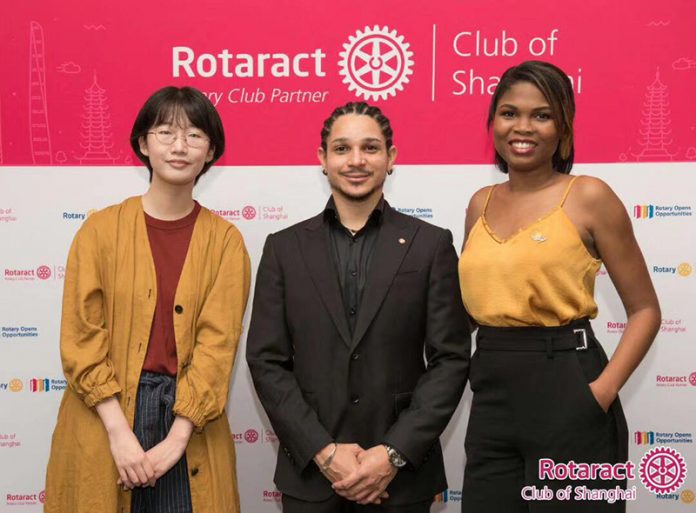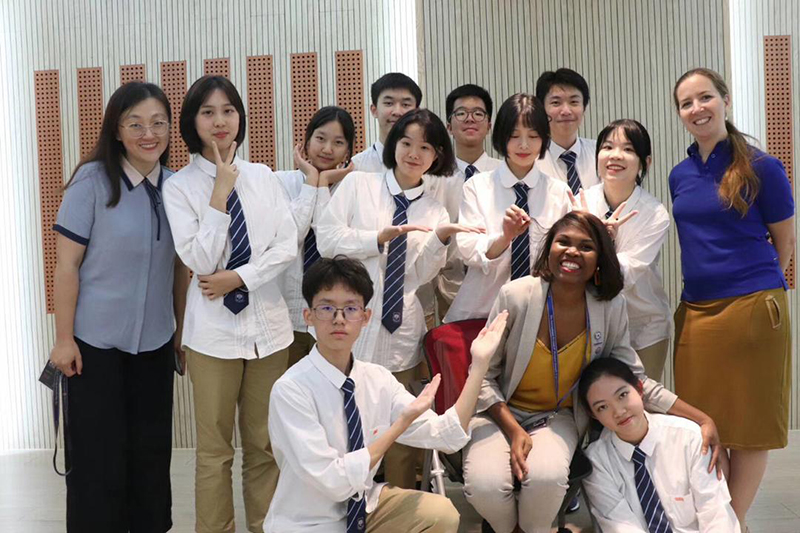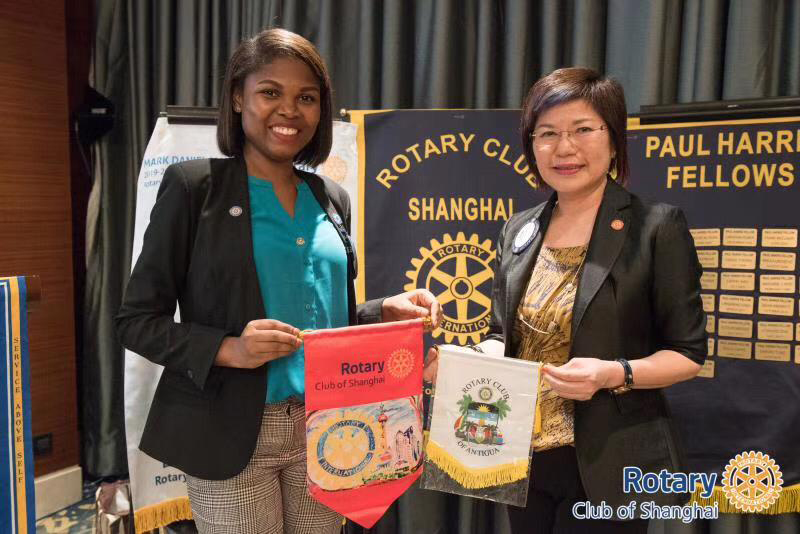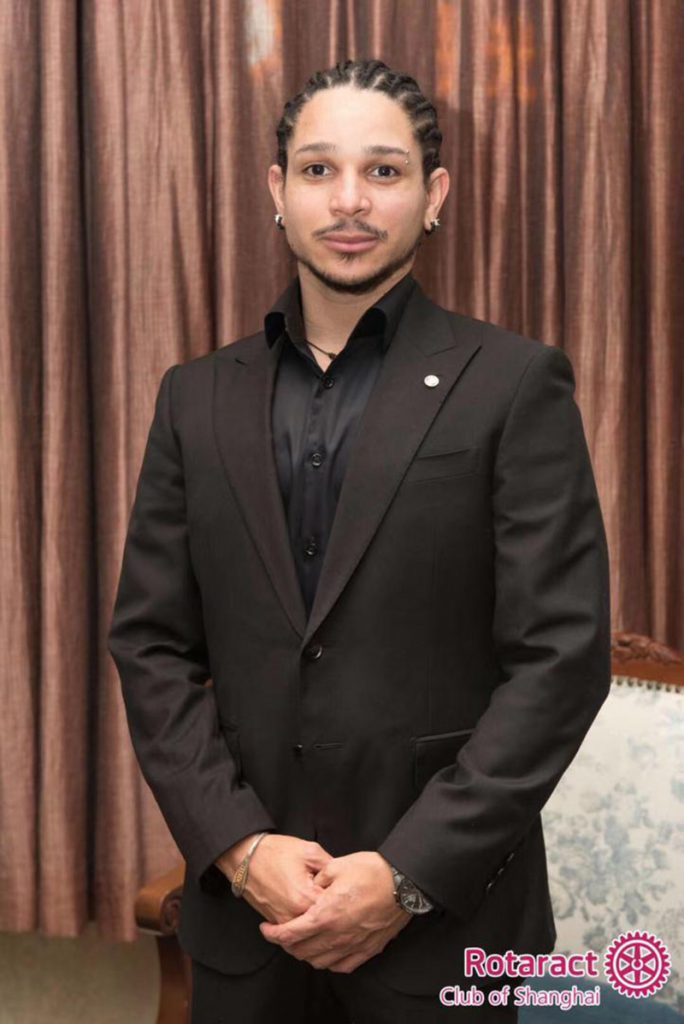

Naomy (front row, center) played a leading role in building the foundation of Interact Clubs in International and Bilingual schools in Shanghai, as part of Rotary International’s Youth Service arm. 
Naomy Peña (left), Vice President of the Rotary Club of Shanghai. 
Jon-Mikel Best, President of the Rotaract Club of Shanghai.
By Orville Williams
Though they hail from a small island in the eastern Caribbean, that modest background has not stopped Naomy Peña and Jon-Mikel Best from shattering the status quo and establishing themselves as leaders in two of the world’s oldest service organisations, all the way in mainland China.
Peña is currently the Vice President of the Rotary Club of Shanghai – the second-oldest club in Asia, being around for 101 years – and became not only the youngest person to fill a leadership role in the organisation’s history, but also the first non-Caucasian and non-Asian, as well as the first from Antigua and Barbuda and the Caribbean.
Best is the current President of the Rotaract Club of Shanghai, and like Peña, he is also the first person from Antigua and Barbuda and the first from the Caribbean.
Peña is a graduate of the Antigua Girls High School (AGHS), while Best is an old boy of the Princess Margaret School (PMS). Both left Antigua and Barbuda with scholarships to further their education in China and are now making waves in Shanghai.
They spoke to Observer about their momentous achievements, what it took to get there, and what they’re hoping to achieve as social leaders.
Naomy’s Rotary Story
“Back in high school, I was an Interactor [Interact is Rotary International’s service club for youth, aged 12 to 18] and then through the scholarship, I ended up in China. But I didn’t do the Rotaract here, I skipped that and went straight into Rotary.
“I started Rotary here in Shanghai about five years ago and my first role was Youth Service Chair. Youth Service is the organ of Rotary International responsible for supporting and guiding both the Rotaract and the Interact clubs.”
She spent about three years in Youth Service, playing a pivotal role in laying a “stronger foundation” for the five, going on six Interact clubs within their purview, in both International and Bilingual schools.
“Through Rotary, I have been collaborating with the schools to help them build stronger service models, because curriculums like [International Baccalaureate] IB and [Advanced Placement] AP now include service as part of the programme.
“It’s no longer just subjects, students have to write particular papers, show that they are critical thinkers and they also have to show that they can be global citizens – so, that’s where I come in.”
Naomy was voted as Vice President last year, “with the understanding that she is expected to run for President in the next two years.”
Jon-Mikel’s Rotaract Story
“For me, it started out with volunteer work with Naomy and Rotary here in Shanghai. I also worked with Rotary back in Antigua for quite some time, but coming to Shanghai was just a different [experience].
“I worked on various voluntary projects with [Rotary] and eventually, [Naomy] got me in contact with the Rotaract here. They thought I was quite intriguing and inducted me almost immediately.”
Jon-Mikel was a ‘regular’ member of the Rotaract club for about six months, before he was approached to become part of the board. He started with a role as Secretary, moved on to become the President’s ‘right hand’ and when the Vice President at the time left the country and wasn’t able to return, he stepped in to fill that gap, due to stipulations in the club’s by-laws.
According to Jon-Mikel, that step up helped him command more attention on the board and helped to sharpen his leadership skills. It was almost inevitable then, that close to the end of his first year, there was a unanimous vote that he should be the next President of the club, for the period 2021-22.
Challenges reaching the top
Despite the capabilities, the willingness and the ambition of both Antiguans, their path to the top was not easy and several obstacles had to be overcome on the way.
The major hurdle was a yet-to-be-resolved disconnect between the Rotary International organization and China itself, with Rotary yet to be officially recognised as a registered [non-governmental organisation] NGO.
This has resulted in persons from mainland China – with a few recent exemptions – being barred from becoming members, meaning all the clubs within the organisation comprise foreign passport holders.
The effect that had on Naomy and Jon-Mikel was them struggling to find a voice among the members from, often times, bigger and more imposing countries.
“Coming from a small nation in the Caribbean, not many people knew about [Antigua and Barbuda], so it was more or less a constant battle to educate them on where we’re from, who we are, what we do and what we’re about.
“It was like a power struggle. Because we’re not so big on the economy scale and things like that, they tended to ignore our opinions, they sometimes tried to talk down to us and overshadow us,” Jon-Mikel explained.
That did not last forever though, as he added, “As we got more affiliated, more acquainted with each other, they realised that we’re not the type of people to mess with. We do not just stand by and have people talk trash or walk over us.”
Being the first members from both Antigua and Barbuda and the Caribbean also proved an issue that the duo had to tackle to get to where they are, specifically as there was no ‘home base’ in Shanghai to rely on for support.
As Pena explained, “I don’t want it to sound like it was just, from the get-go, ‘you guys are from this small island [so] we won’t listen to you’. It wasn’t really like that. It was more of a [situation where] everyone else has someone who’s from that same country.
“We stepped in and we looked different, we sounded different and we approached things differently, so that came with a few questions and curiosities.”
She also had to deal with some gender-related issues that – again, due to their resilience – were put to rest very quickly.
“In my case, unfortunately, there were Caucasian men making inappropriate comments, but that was shut down really fast. As [Jon-Mikel] said, the minute they realized that we’re not pushovers, that we’re not the ones to go hide in the corner when someone says something we don’t like, it changed very quickly.”
Ageism was another big mountain Naomy and Jon-Mikel had to climb, due to the fact their counterparts already had ideas of how old leaders in their clubs ‘should be.’
“Jon-Mikel is among the youngest in his club and he’s still a student, so the other Rotaractors were [skeptical], as they would have already started working. But as soon as they realised that he does have working experience and he’s just taking time to study, and he was again, able to show that he’s not a child, it sorted itself out.
“In my case as well, being one of the younger members, they kind of expected that I would be coming in as a dependent, but I do have an administrative role in my job – which has actually helped them in many cases – so that changed very quickly as well.
“They weren’t expecting us to have a certain mindset or a certain level of maturity because of our age,” Naomy said.
Dealing with the Covid-19 pandemic
The spread of Covid-19 crippled almost every country in the world on various levels, with Caribbean countries among the hardest-hit from a social and economic standpoint.
Naomy told us, however, “The pandemic was a different experience for us here than what we’ve read and heard about in the Caribbean.”
Both herself and Jon-Mikel were in the Philippines when the outbreak started and getting back into China, she said, was a logistical hassle.
Once they got back in, she explained that there was a “slight bit of xenophobia” toward foreigners, with some parts of the media perpetuating the idea that foreigners brought [Covid] into the country. Some businesses even tried to unlawfully scrutinise foreigners, but she said the government was swift in stamping that out.
“There was an entire hotline to report anyone who behaved in a less-than-professional manner, because you were a foreigner.”
Besides that, she said the most challenging part of the entire pandemic has been not being able to travel outside of China.
Lessons learnt in China
Along with enriching their personal life experiences, both Naomy and Jon-Mikel have learnt valuable professional lessons that they believe could serve to improve their home country.
For Jon-Mikel, who is studying economics and trade, he sees admirable traits among the Chinese that would help to improve Antigua and Barbuda’s socio-economic state, if replicated here.
“One thing I’ve learned from the Chinese in terms of economics, is they invest in themselves. They allocate resources among their own people, they keep the country well-maintained and they keep all of their people busy.
“You see where every single tax dollar goes and unemployment is really low. If somebody is without a job, that is his or her choice.”
For Naomy, who is an educator, the pandemic showed her that there is still so much work to do within that sector here in Antigua and Barbuda.
“Sometimes in my line of work, advanced education, I do have moments where I feel a bit guilty that I’m offering this type of quality education to students who are not from my background. Because I see the outcomes, I see when they get into these top-50, top-20 universities and they have all these opportunities.
“During the pandemic, I realised exactly how much it was needed, because while we went smoothly into online learning – we had Zoom and everything [prepared] curriculum-wise – I was speaking to friends who are educators back home and they were struggling.”
She explained further, that in trying to offer some of these online resources to her colleague educators, it all seemed like foreign material to them, which was disheartening. “The gap cannot be that big,” she said to herself then, adding that, “It was a real eye-opener and a rude awakening.”
“I remember suggesting schooling over the radio, schooling based on year group by the hour on television, and these are things that could fit the infrastructure that is already in place.”
“Trust me, I am so proud of having a Caribbean education, but there’s so much more that could be done to bridge that gap and to give the students the necessary skills, beyond textbook knowledge.”
Naomy also disclosed that she has made efforts to enter the education system here in Antigua with the hope of sharing her expertise, but for whatever reason, the opportunities were just not available to her.
How they are faring now
Jon-Mikel is currently in the last year of his Bachelor’s degree in Economics and Trade at Tongji University, after starting in the engineering field, but having a “change of heart.” He is scheduled to graduate next June.
Naomy, meanwhile, graduated from the China University of Geosciences (Wuhan) in 2014, with a degree in Environmental Engineering. She is currently the Head of Geography and whole-school Service Learning Coordinator at a private bilingual school.
